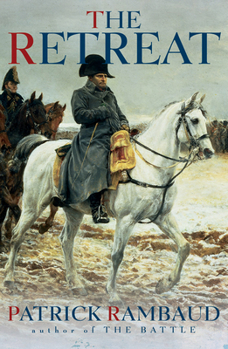Book Overview
The spectacular sequel to The Battle, winner of the Prix Goncourt and the Grand Prix Roman de l'Acad mie Fran aise, this stunning second volume of Patrick Rambaud's Napoleonic trilogy opens in... This description may be from another edition of this product.
Format:Paperback
Language:English
ISBN:0802142656
ISBN13:9780802142658
Release Date:May 2006
Publisher:Grove Press
Length:336 Pages
Weight:0.88 lbs.
Dimensions:0.8" x 5.9" x 8.1"
Related Subjects
Contemporary Fiction Genre Fiction Historical Humanities Literature Literature & FictionCustomer Reviews
3 ratings
Literature as history
Published by Thriftbooks.com User , 17 years ago
In his notes after this novel, Rambaud says: "History is not an exact science; ...it should be left to dreamers who can recreate it by instinct". This novel is such an attempt, and it is as literature as a form of history that it excels. The more novelistic elements, especially Sebastian Roque, the secretary, serve their purpose well, and are entertaining, even credible. Rambaud's sympathies, and his cynicism about Napolean and about human beings under stress are apparent, but his is a detached view of the events: he wishes to appeal more to the reader's intellect and capacity for understanding than to his/her emotions.
Epic events reduced to a human scale
Published by Thriftbooks.com User , 19 years ago
Patrick Rambaud is an excellent writer. He plots this account around the retreat from Moscow by the Grande Armee in the Fall of 1812. The story begins as the French enter the gates of Moscow and ends months later as the survivors of the story return to their lives in Paris surprisingly unimpaired psychologically by one of the great military catastrophes of history. The major events include the burning of Moscow, the aftermath of the fire, the return from Moscow to the Beresina and the passage through Poland and Prussia on the way to Paris. Against this backdrop, we find in Rambaud's account a human scale where survivors focus on the task of survival and insulate themselves from the chaos and horror of events. He organizes each of the few chapters as if describing details of paintings at each phase of the story. His writing is crisp and imaginative. He evokes texture and empathy. But, he is not sympathetic or opinionated. He does not allow the big picture to overtake or obscure the events of his retelling. The main characters of the story are never far from the Emperor. The result is the perspective of human scale in the midst of epic events and horrors. Napoleon himself is featured in much of the dialogue and we see how simply the critical decisions such as waiting in Moscow for the Czar to capitulate, retreating from Moscow to escape the peril of Winter in the ruined capital, taking the northern rather than the southern route of egress, choosing the point of crossing the Beresina and separating the Emperor from the Armee to return to Paris are obtained. The book does not moralize about the immense failure of the invasion of Russia in 1812. It would be more accurate to say that Mr. Rambaud conveys a sense that great historical catastrophe arises as a series of smaller miscalculations. The strategic and tactical decisions fatefully recounted in the Retreat reflect the competition of views among the Marshals and the generals. Helpful insights about the decisions reduce the events to the level individuals can comprehend. And we are left entirely un-reassured; complete with the disconcerting view that we ourselves may have made all the same decisions in all the same ways. Rather than revising history, Mr. Rambaud changes our perspective. The tale of the carnage and ugliness of the retreat from Moscow is often told and retold. There is little new or revealing in the Retreat about these horrible aspects of the story. Other writers have collectively told the larger story. What seems new in the Retreat is the degree this book adds to the literature a stoic perspective and a human scale. It examines how survivors made their way through the events without being overtaken by them.
Pulls You Right In
Published by Thriftbooks.com User , 19 years ago
Having read several accounts of Napoleon's retreat from Moscow, I wasn't sure this book would have much new to offer. I'm happy to say my fears were unfounded. By turning it into a story, rather than presenting a dry history, Rambaud puts his audience inside the minds of the soldiers, the civilians, and even the Emperor, himself, in a way that would be impossible for a single eyewitness or purely factual account to do. He displays all the callousness, horror, desperation, venality, and irony of the retreat through the thoughts and actions of his characters. It's this personal approach that hooks you from page one. Although the extensive research behind the story is obvious, Rambaud doesn't bog down the narrative with numbers and dates and lists. He keeps the story moving at a brisk pace. And no matter which side of the Napoleon-was-a-Hero/Napoleon-was-Evil debate you fall on, whether you're pro-French or pro-Russian, this book will make you feel for those poor French soldiers. It will also make you rethink your understanding of the words "wretched," "tragic," and "waste."






